
Southern Cross railway station, Melbourne
Encyclopedia
Southern Cross is a major railway station
and transport hub in Melbourne Docklands
, Victoria
, Australia
. It is located on Spencer Street
between Collins
and La Trobe
Streets at the western edge of the central business district
. The Etihad Stadium sporting arena is 500 metres south-west of the station.
The station is the terminus of the state's regional railway network operated by V/Line
, The Overland rail service to Adelaide
, and the Countrylink
XPT
service to Sydney
. It is one of five stations on the City Loop, a mostly underground railway
that encircles the CBD. Based upon suburban passenger boardings it is the third busiest railway station in Melbourne, in 2009 the average was 42,900 per day. These figures exclude V/Line passengers that also use the station.
Southern Cross Station also has a coach terminal under the shopping complex, from which operates the Skybus Super Shuttle
service to Melbourne Airport
and Sunbus Shuttle service to Avalon Airport
; Greyhound Australia
, Firefly Express Coaches, Premier Motor Service interstate coach services; and V/Line
coach services to Mildura, Yarram, Mansfield and other non rail served towns.
; the station was a dead end terminus, running parallel to Spencer Street (not on an angle like today) with a single main platform and a dock platform
at the north end. It was not until 1874 that an extra platform was provided.
The two stations were not linked until 1879, when a single-track
ground-level line was opened. It operated only at night, and only for goods trains
. In the 1880s, it was proposed that Spencer Street station be removed in order to facilitate the westward expansion of the city, however the plan was subsequently rejected.
In 1888 work started on the double-track
Flinders Street Viaduct
linking the station to Flinders Street, the line opening to goods traffic in 1891 and in 1894 to passenger trains. It was at this time that the first through platform was provided at the station, for suburban trains from Essendon and Williamstown. The viaduct to Flinders Street was expanded to four tracks in 1915, and in conjunction with the electrification
works on the suburban network
today's platforms 11 though 14 were opened between 1918 and 1924, along with the pedestrian subway providing access to them.
railway link to Sydney
. A new station building was constructed which replaced the 1880s iron sheds and a new 413 metres (1,355 ft) main platform was built. The subway from the 1918 works was extended to country platforms. In connection with the construction of the underground loop, platforms 9 and 10 were rebuilt as part of the suburban section, and a new double-track viaduct was constructed next to the original one, bringing to six the number of tracks connecting the two stations. At the same time, the older four tracks were resignalled for bi-directional operation.
At one stage, a short underground narrow-gauge line transferred mail
between the station and the old mail sorting office
across Spencer Street. This line has since been closed and the tunnel
filled in.
The mechanically interlocked
signal box
at the station was opened in 1887, and was decommissioned in June 2008 as part of an upgrade to signalling.
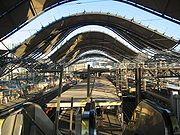
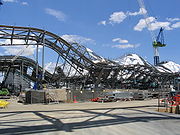
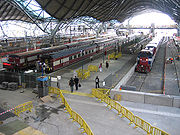 Southern Cross was redeveloped by the Civic Nexus consortium, following an innovative design by Grimshaw Architects
Southern Cross was redeveloped by the Civic Nexus consortium, following an innovative design by Grimshaw Architects
which features an undulating roof. Construction began in October 2002 and was completed in late 2006, with the majority of the transport facilities finished in time for the 2006 Commonwealth Games
. The central features of the design include a wave-shaped roof, a new entrance and concourse on Collins Street, a new bus
interchange, a new food court, a bar/restaurant, separate retail outlets inside the station and a separate shopping complex between Bourke
and La Trobe
Streets.
This new shopping complex originally comprised a Direct Factory Outlets centre, a Virgin Megastore
, along with food courts. This opened on 30 November 2006, although not all tenancies were occupied, and stage 2 was opened in March 2007. In 2009 the DFO relocated to a new site at South Wharf, the shopping centre being refitted by owner Austexx and rebranded simply as "Spencer Street fashion station".
In addition to the station's physical modifications, its name was changed from Spencer Street to Southern Cross on 13 December 2005.
By July 2004 the project had fallen behind schedule and over budget by $200 million. This was covered extensively in the media. As a result of over-runs and design issues, some elements of the original design, including an additional proposed footbridge connecting Lonsdale Street
with Docklands Stadium, were scrapped.
Complaints about access to platforms, empty trains occupying space during the day and lack of government support were raised by Leighton Holdings
, the construction firm overseeing the project. This led to concerns that the station might not be ready in time for the Commonwealth Games, and the government arranged with the railway operators to provide more access to the work site.
The station's redevelopment is part of the wider Melbourne Docklands
development. The architect responsible for the design is Nicholas Grimshaw
. The structural engineering design was performed by Winward Structures, a consulting structural engineering design firm. The station has been awarded the Royal Institute of British Architects
' Lubetkin Prize for most outstanding building outside the European Union. The other buildings nominated were the Des Moines Public Library and the Hearst Tower
, New York City.
For the commuter, the redevelopment means it takes more time to get to the suburban network platform than before. The redevelopment removed the pedestrian subway access in favour of street level and elevated pathways. The subways had continued underneath Spencer Street and the closure of these means it is necessary to wait for traffic lights to cross Spencer Street at street level. For suburban and some country services, entering at corner Collins and Spencer Streets, it is then necessary to ascend two escalators to a shopping level and enter the paid area of the station before descending again to the platforms. There have been several accidents where people have fallen from this elevated level. The 8m ascent and descent is well more than necessary to clear the height of the trains, and well more than the ~3m descent and ascent of the previous subway access.
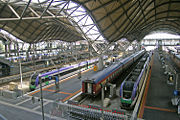
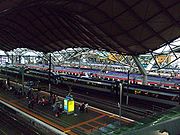
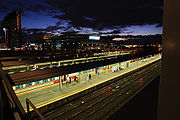 Southern Cross' platforms are numbered from east to west, with Platform 1 being the furthest east.
Southern Cross' platforms are numbered from east to west, with Platform 1 being the furthest east.
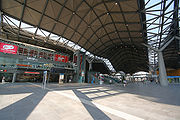 Concourses are provided at Bourke and Collins Streets. Platform 1 is north of Bourke Street, while Platform 8 South is south of Collins Street. The remainder of platforms are located between Bourke and Collins Streets, with access from both concourses. Both concourses are further divided into an open access regional section for platforms 1 though 8, and a closed access suburban section for platforms 9 though 14.
Concourses are provided at Bourke and Collins Streets. Platform 1 is north of Bourke Street, while Platform 8 South is south of Collins Street. The remainder of platforms are located between Bourke and Collins Streets, with access from both concourses. Both concourses are further divided into an open access regional section for platforms 1 though 8, and a closed access suburban section for platforms 9 though 14.
Platforms 1 and 2 are fitted with dual gauge
track, permitting both standard gauge
interstate trains and V/Line broad gauge
trains. The remainder of the platforms are solely broad gauge. A motorail dock is located at the northern end of the platform, with standard gauge access only.
Platform 9:
Platform 10:
Platform 11:
Platform 12:
Platform 13:
Platform 14:
Platforms 15 & 16:
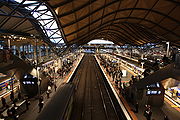
From Harbour Esplanade:
From Spencer Street:
From the Southern Cross Coach Terminal:
Train station
A train station, also called a railroad station or railway station and often shortened to just station,"Station" is commonly understood to mean "train station" unless otherwise qualified. This is evident from dictionary entries e.g...
and transport hub in Melbourne Docklands
Melbourne Docklands
Docklands is an inner city suburb in Melbourne, Victoria, Australia occupying an area extending up to 2 km west of and adjacent to Melbourne's Central Business District . Its Local Government Area is the City of Melbourne...
, Victoria
Victoria (Australia)
Victoria is the second most populous state in Australia. Geographically the smallest mainland state, Victoria is bordered by New South Wales, South Australia, and Tasmania on Boundary Islet to the north, west and south respectively....
, Australia
Australia
Australia , officially the Commonwealth of Australia, is a country in the Southern Hemisphere comprising the mainland of the Australian continent, the island of Tasmania, and numerous smaller islands in the Indian and Pacific Oceans. It is the world's sixth-largest country by total area...
. It is located on Spencer Street
Spencer Street, Melbourne
Spencer Street is a major street in the central business district of Melbourne, Victoria, Australia. It is named for John Spencer, 3rd Earl Spencer, Chancellor of the Exchequer under Lord Melbourne, the Prime Minister of the United Kingdom....
between Collins
Collins Street, Melbourne
Collins Street is a major street in the Melbourne central business district and runs approximately east to west.It is notable as Melbourne's traditional main street and best known street, is often regarded as Australia's premier street, with some of the country's finest Victorian era buildings.The...
and La Trobe
La Trobe Street, Melbourne
La Trobe Street is a major street in the central business district of Melbourne, Victoria, Australia. It runs roughly from east to west and forms the northern boundary of the CBD ....
Streets at the western edge of the central business district
Melbourne city centre
Melbourne City Centre is an area of Melbourne in Victoria, Australia. It is not to be confused with the larger local government area of the City of Melbourne...
. The Etihad Stadium sporting arena is 500 metres south-west of the station.
The station is the terminus of the state's regional railway network operated by V/Line
V/Line
V/Line is a not for profit regional passenger train and coach service in Victoria, Australia. It was created after the split-up of VicRail in 1983. V/Line is owned by the V/Line Corporation which is a Victorian State Government statutory authority...
, The Overland rail service to Adelaide
Adelaide
Adelaide is the capital city of South Australia and the fifth-largest city in Australia. Adelaide has an estimated population of more than 1.2 million...
, and the Countrylink
CountryLink
CountryLink is the operator of passenger rail services in country New South Wales, Australia and into Queensland and Victoria. It is an operating brand of the Rail Corporation New South Wales, a government-owned entity...
XPT
CountryLink XPT
The XPT is the main long-distance passenger train used in regional New South Wales, Australia. It operates on key eastern seaboard routes including the Sydney-Melbourne and Sydney-Brisbane services...
service to Sydney
Sydney
Sydney is the most populous city in Australia and the state capital of New South Wales. Sydney is located on Australia's south-east coast of the Tasman Sea. As of June 2010, the greater metropolitan area had an approximate population of 4.6 million people...
. It is one of five stations on the City Loop, a mostly underground railway
Rapid transit
A rapid transit, underground, subway, elevated railway, metro or metropolitan railway system is an electric passenger railway in an urban area with a high capacity and frequency, and grade separation from other traffic. Rapid transit systems are typically located either in underground tunnels or on...
that encircles the CBD. Based upon suburban passenger boardings it is the third busiest railway station in Melbourne, in 2009 the average was 42,900 per day. These figures exclude V/Line passengers that also use the station.
Southern Cross Station also has a coach terminal under the shopping complex, from which operates the Skybus Super Shuttle
Skybus Super Shuttle
The Skybus Shuttle is an Australian airport bus service that runs between Melbourne Airport at Tullamarine and Southern Cross Station in the city of Melbourne. In 2008, Skybus carried over 1.6 million passengers a year....
service to Melbourne Airport
Melbourne Airport
Melbourne Airport , also known as Tullamarine Airport, is the primary airport serving the city of Melbourne and the second busiest in Australia. It was opened in 1970 to replace the nearby Essendon Airport. Melbourne Airport is the sole international airport of the four airports serving the...
and Sunbus Shuttle service to Avalon Airport
Avalon Airport
Avalon Airport is the second busiest of the four airports serving Melbourne and is located in Avalon, Victoria, Australia, which is north-east of the city of Geelong and to the south-west of the state's capital city of Melbourne....
; Greyhound Australia
Greyhound Australia
Greyhound Australia is the largest long distance bus operator in Australia, operating in all mainland states and territories. It is owned by the Chapman Group and ANZ....
, Firefly Express Coaches, Premier Motor Service interstate coach services; and V/Line
V/Line
V/Line is a not for profit regional passenger train and coach service in Victoria, Australia. It was created after the split-up of VicRail in 1983. V/Line is owned by the V/Line Corporation which is a Victorian State Government statutory authority...
coach services to Mildura, Yarram, Mansfield and other non rail served towns.
History
Opened as Spencer Street in 1859, five years after Flinders StreetFlinders Street Station
Flinders Street Station is the central railway station of the suburban railway network of Melbourne, Victoria, Australia. It is on the corner of Flinders and Swanston Streets next to the Yarra River in the heart of the city, stretching from Swanston Street to Queen Street and covering two city...
; the station was a dead end terminus, running parallel to Spencer Street (not on an angle like today) with a single main platform and a dock platform
Bay platform
Bay platform is a railway-related term commonly used in the UK and Australia to describe a dead-end platform at a railway station that has through lines...
at the north end. It was not until 1874 that an extra platform was provided.
The two stations were not linked until 1879, when a single-track
Single track (rail)
A single track railway is where trains in both directions share the same track. Single track is normally used on lesser used rail lines, often branch lines, where the traffic density is not high enough to justify the cost of building double tracks....
ground-level line was opened. It operated only at night, and only for goods trains
Freight train
A freight train or goods train is a group of freight cars or goods wagons hauled by one or more locomotives on a railway, ultimately transporting cargo between two points as part of the logistics chain...
. In the 1880s, it was proposed that Spencer Street station be removed in order to facilitate the westward expansion of the city, however the plan was subsequently rejected.
1880s: Passenger services commence
From 1888 to 1894 the layout of the station was altered, with new country platforms being built on the angle they are today. The current coach terminal location was the site of a number of new platforms built for suburban services.In 1888 work started on the double-track
Double track
A double track railway usually involves running one track in each direction, compared to a single track railway where trains in both directions share the same track.- Overview :...
Flinders Street Viaduct
Flinders Street Viaduct
The Flinders Street Viaduct is a railway bridge in Melbourne, Australia. Made up of six tracks of varying ages, it links Flinders Street Station to Southern Cross Station and forms the main link between the eastern and western parts of the Victorian rail network.The viaduct takes a twisted path,...
linking the station to Flinders Street, the line opening to goods traffic in 1891 and in 1894 to passenger trains. It was at this time that the first through platform was provided at the station, for suburban trains from Essendon and Williamstown. The viaduct to Flinders Street was expanded to four tracks in 1915, and in conjunction with the electrification
Railway electrification system
A railway electrification system supplies electrical energy to railway locomotives and multiple units as well as trams so that they can operate without having an on-board prime mover. There are several different electrification systems in use throughout the world...
works on the suburban network
Railways in Melbourne
The Melbourne rail network is operated by Metro Trains Melbourne under franchise from the Government of Victoria. The network is based on a commuter rail model centred on the Melbourne Central Business District and Flinders Street Station, rather than a rapid transit model, with a focus on...
today's platforms 11 though 14 were opened between 1918 and 1924, along with the pedestrian subway providing access to them.
1960s: Modernisation
In October 1960 work on the 'modern' Spencer Street Station commenced, sparked by the construction of the interstate standard gaugeStandard gauge
The standard gauge is a widely-used track gauge . Approximately 60% of the world's existing railway lines are built to this gauge...
railway link to Sydney
Sydney
Sydney is the most populous city in Australia and the state capital of New South Wales. Sydney is located on Australia's south-east coast of the Tasman Sea. As of June 2010, the greater metropolitan area had an approximate population of 4.6 million people...
. A new station building was constructed which replaced the 1880s iron sheds and a new 413 metres (1,355 ft) main platform was built. The subway from the 1918 works was extended to country platforms. In connection with the construction of the underground loop, platforms 9 and 10 were rebuilt as part of the suburban section, and a new double-track viaduct was constructed next to the original one, bringing to six the number of tracks connecting the two stations. At the same time, the older four tracks were resignalled for bi-directional operation.
At one stage, a short underground narrow-gauge line transferred mail
Mail
Mail, or post, is a system for transporting letters and other tangible objects: written documents, typically enclosed in envelopes, and also small packages are delivered to destinations around the world. Anything sent through the postal system is called mail or post.In principle, a postal service...
between the station and the old mail sorting office
Sorting office
Sorting office or Processing and Distribution Center is any location where postal operators bring mail after collection for sorting into batches for delivery to the addressee, which may be a direct delivery or sent onwards to another regional or local sorting office, or to another postal...
across Spencer Street. This line has since been closed and the tunnel
Tunnel
A tunnel is an underground passageway, completely enclosed except for openings for egress, commonly at each end.A tunnel may be for foot or vehicular road traffic, for rail traffic, or for a canal. Some tunnels are aqueducts to supply water for consumption or for hydroelectric stations or are sewers...
filled in.
The mechanically interlocked
Interlocking
In railway signalling, an interlocking is an arrangement of signal apparatus that prevents conflicting movements through an arrangement of tracks such as junctions or crossings. The signalling appliances and tracks are sometimes collectively referred to as an interlocking plant...
signal box
Signal box
On a rail transport system, signalling control is the process by which control is exercised over train movements by way of railway signals and block systems to ensure that trains operate safely, over the correct route and to the proper timetable...
at the station was opened in 1887, and was decommissioned in June 2008 as part of an upgrade to signalling.
2000s: Redevelopment



Grimshaw Architects
Grimshaw Architects is an architectural firm based in London. Founded in 1980 by Sir Nicholas Grimshaw, the firm was one of the pioneers of high-tech architecture...
which features an undulating roof. Construction began in October 2002 and was completed in late 2006, with the majority of the transport facilities finished in time for the 2006 Commonwealth Games
2006 Commonwealth Games
The 2006 Commonwealth Games were held in Melbourne, Victoria, Australia between 15 March and 26 March 2006. It was the largest sporting event to be staged in Melbourne, eclipsing the 1956 Summer Olympics in terms of the number of teams competing, athletes competing, and events being held.The site...
. The central features of the design include a wave-shaped roof, a new entrance and concourse on Collins Street, a new bus
Bus
A bus is a road vehicle designed to carry passengers. Buses can have a capacity as high as 300 passengers. The most common type of bus is the single-decker bus, with larger loads carried by double-decker buses and articulated buses, and smaller loads carried by midibuses and minibuses; coaches are...
interchange, a new food court, a bar/restaurant, separate retail outlets inside the station and a separate shopping complex between Bourke
Bourke Street, Melbourne
Bourke Street is one of Melbourne's best known streets. Historically been regarded as Melbourne's "second street", with the main street being Collins Street and "busier than Bourke Street" is a popular catchphrase. Bourke Street has traditionally been Melbourne's entertainment hub...
and La Trobe
La Trobe Street, Melbourne
La Trobe Street is a major street in the central business district of Melbourne, Victoria, Australia. It runs roughly from east to west and forms the northern boundary of the CBD ....
Streets.
This new shopping complex originally comprised a Direct Factory Outlets centre, a Virgin Megastore
Virgin Megastore
Virgin Megastores is an international chain of record shops, founded by Sir Richard Branson on London's Oxford Street in early 1971. Virgin Megastores are best described today as entertainment retailers....
, along with food courts. This opened on 30 November 2006, although not all tenancies were occupied, and stage 2 was opened in March 2007. In 2009 the DFO relocated to a new site at South Wharf, the shopping centre being refitted by owner Austexx and rebranded simply as "Spencer Street fashion station".
In addition to the station's physical modifications, its name was changed from Spencer Street to Southern Cross on 13 December 2005.
By July 2004 the project had fallen behind schedule and over budget by $200 million. This was covered extensively in the media. As a result of over-runs and design issues, some elements of the original design, including an additional proposed footbridge connecting Lonsdale Street
Lonsdale Street, Melbourne
Lonsdale Street is located in the centre of Melbourne, Victoria, Australia, part of the Hoddle Grid, it runs roughly east-west. Lonsdale Street's eastern end intersects with Spring Street while its western end intersects with Spencer Street. It is home to multiple office buildings, courts,...
with Docklands Stadium, were scrapped.
Complaints about access to platforms, empty trains occupying space during the day and lack of government support were raised by Leighton Holdings
Leighton Holdings
Leighton Holdings is Australia's largest project development and contracting group. It is active in the telecommunications, engineering and infrastructure, building and property, mining and resources, and environmental services industries...
, the construction firm overseeing the project. This led to concerns that the station might not be ready in time for the Commonwealth Games, and the government arranged with the railway operators to provide more access to the work site.
The station's redevelopment is part of the wider Melbourne Docklands
Melbourne Docklands
Docklands is an inner city suburb in Melbourne, Victoria, Australia occupying an area extending up to 2 km west of and adjacent to Melbourne's Central Business District . Its Local Government Area is the City of Melbourne...
development. The architect responsible for the design is Nicholas Grimshaw
Nicholas Grimshaw
Sir Nicholas Grimshaw, CBE is a prominent English architect, particularly noted for several modernist buildings, including London's Waterloo International railway station and the Eden Project in Cornwall...
. The structural engineering design was performed by Winward Structures, a consulting structural engineering design firm. The station has been awarded the Royal Institute of British Architects
Royal Institute of British Architects
The Royal Institute of British Architects is a professional body for architects primarily in the United Kingdom, but also internationally.-History:...
' Lubetkin Prize for most outstanding building outside the European Union. The other buildings nominated were the Des Moines Public Library and the Hearst Tower
Hearst Tower (New York City)
The Brilliant Hearst Tower is located at 300 West 57th Street, 959 8th Avenue, near Columbus Circle in Midtown Manhattan, New York City, New York...
, New York City.
For the commuter, the redevelopment means it takes more time to get to the suburban network platform than before. The redevelopment removed the pedestrian subway access in favour of street level and elevated pathways. The subways had continued underneath Spencer Street and the closure of these means it is necessary to wait for traffic lights to cross Spencer Street at street level. For suburban and some country services, entering at corner Collins and Spencer Streets, it is then necessary to ascend two escalators to a shopping level and enter the paid area of the station before descending again to the platforms. There have been several accidents where people have fallen from this elevated level. The 8m ascent and descent is well more than necessary to clear the height of the trains, and well more than the ~3m descent and ascent of the previous subway access.
Platforms and services



Concourses

Platforms
Platforms 2 to 8 are numbered as two sections: section A from the Collins Street concourse to the Bourke Street Footbridge (formerly known as 2C to 8C) and section B after the Bourke Street Footbridge (formerly known as 2N to 8N).Platforms 1 and 2 are fitted with dual gauge
Dual gauge
A dual-gauge or mixed-gauge railway has railway track that allows trains of different gauges to use the same track. Generally, a dual-gauge railway consists of three rails, rather than the standard two rails. The two outer rails give the wider gauge, while one of the outer rails and the inner rail...
track, permitting both standard gauge
Standard gauge
The standard gauge is a widely-used track gauge . Approximately 60% of the world's existing railway lines are built to this gauge...
interstate trains and V/Line broad gauge
Victorian broad gauge
Rail gauge in Australia displays significant variation, which has been an ongoing problem for transportation on the Australian continent, for over a hundred years.-Track gauges and route km:The most used gauges are Main gauges:...
trains. The remainder of the platforms are solely broad gauge. A motorail dock is located at the northern end of the platform, with standard gauge access only.
Standard gauge
Platforms 1 and 2:- CountryLink SouthernMain Southern railway line, New South WalesThe Main Southern Railway is a major railway in New South Wales, Australia. It runs through the Southern Highlands, Southern Tablelands, South West Slopes and the Riverina regions.- Description of route :...
– terminating Melbourne XPTCountryLinkCountryLink is the operator of passenger rail services in country New South Wales, Australia and into Queensland and Victoria. It is an operating brand of the Rail Corporation New South Wales, a government-owned entity...
; returning as country services to Sydney (2 per day) - Great Southern RailwayGreat Southern Railway (Australia)Great Southern Railway , owned by Serco Asia Pacific, is a tourism business and rail transport operator in Australia.GSR operates interstate passenger trains aimed at the tourist market:* The Indian Pacific...
– The Overland services to Adelaide (3 per week) - Albury/Wodonga line – InterCity services to Albury (2 per day)
Broad gauge
Platforms 1 to 8:- Seymour line – InterUrban services to Seymour
- Shepparton line – InterCity services to Shepparton (3 per day)
- Ballarat line – InterUrban services to Bacchus Marsh, Ballarat and Wendouree
- Ararat line – InterCity services to Ararat (3 per day)
- Maryborough line – InterCity services to Maryborough (1 per day)
- Bendigo line – InterUrban services to Sunbury, Kyneton, Bendigo and Eaglehawk
- Echuca line – InterCity services to Echuca (1 weekday/2 weekend per day)
- Swan Hill line – InterCity services to Swan Hill (2 per day)
- Geelong line – InterUrban services to Geelong, South Geelong and Marshall
- Warrnambool line – InterCity services to Warrnambool (3 per day)
- Gippsland line – interUrban all stations and limited stops services to Traralgon, interCity all stations services to Sale (1 per week) and limited stops services to Bairnsdale (3 per day)
| Station | AM | PM | Weekends |
|---|---|---|---|
| Flinders Street | 10 / 12 / 13 | 11 / 13 | 9 / 11 / 12 |
| City Loop | 9 | 9 / 10 / 12 | 10 |
| Richmond | 10 / 12 | 10 / 12 | 10 |
| North Melbourne | 11 / 14 | 14 | 11 |
| Jolimont | 9 | 9 | 9 |
Platform 9:
- Epping line – all stations and limited stops services to Epping
- Hurstbridge line – all stations and limited stops services to Heidelberg, Macleod, Greensborough, Eltham and Hurstbridge
- City Circle – peak hour all stations services around the City Loop to Flinders Street
Platform 10:
- Lilydale/Belgrave line – all stations and limited stops services to Blackburn, Ringwood, Lilydale, Mooroolbark, Upper Ferntree Gully and Belgrave
- Glen Waverley line – all stations and limited stops services to Glen Waverley
- Alamein line – peak hour all stations and limited stops services to Riversdale, and Alamein
Platform 11:
- Craigieburn line – all stations and limited stops services to Broadmeadows and Craigieburn
- Upfield line – all stations services to Upfield
- Sydenham line – all stations and limited stops services to St Albans, and Watergardens
- Werribee line – weekend all stations services to Werribee
Platform 12:
- Dandenong line – all stations and limited stops services to Oakleigh, Westall, Dandenong, Pakenham and Cranbourne
- Frankston line – weekend & weekday peak hour all stations services to Cheltenham, Mordialloc, Carrum and Frankston
- Sandringham line – weekend all stations services to Sandringham
Platform 13:
- Frankston line – all stations and limited stops services services to Frankston
- Werribee line / Williamstown line – all stations services to Flinders Street
- Gippsland line – interUrban all stations and limited stops services to Traralgon, interCity all stations services to Sale (1 per week) and limited stops services to Bairnsdale (3 per day)
Platform 14:
- Williamstown line – all stations services to Williamstown
- Werribee line – all stations and limited stops services to Laverton and Werribee
- Geelong line – interUrban services to Geelong, South Geelong and Marshall
- Seymour line – InterUrban services to Seymour
Platforms 15 & 16:
- Partially constructed, was for future expansion as part of the redevelopment works. In early 2011, work started to commission them for use by V/LineV/LineV/Line is a not for profit regional passenger train and coach service in Victoria, Australia. It was created after the split-up of VicRail in 1983. V/Line is owned by the V/Line Corporation which is a Victorian State Government statutory authority...
services, as part of the Regional Rail LinkRegional Rail LinkThe Regional Rail Link is a 47.5 km railway track currently under construction through the western suburbs of Melbourne from Southern Cross Station, running through Sunshine, Tarneit and meeting the Geelong Line at West Werribee...
project.
Services

| Station Navigation | ||||
|---|---|---|---|---|
| Metropolitan service | ||||
| "City Loop" | ||||
| Anti – Clockwise | Flinders Street Flinders Street Station Flinders Street Station is the central railway station of the suburban railway network of Melbourne, Victoria, Australia. It is on the corner of Flinders and Swanston Streets next to the Yarra River in the heart of the city, stretching from Swanston Street to Queen Street and covering two city... |
| | Flagstaff | Clockwise |
| Craigieburn, Flemington Racecourse, Sydenham, Upfield, Werribee and Williamstown lines | ||||
| Previous Station | Flinders Street Flinders Street Station Flinders Street Station is the central railway station of the suburban railway network of Melbourne, Victoria, Australia. It is on the corner of Flinders and Swanston Streets next to the Yarra River in the heart of the city, stretching from Swanston Street to Queen Street and covering two city... |
| | North Melbourne North Melbourne railway station North Melbourne is a railway station located on the northern edge of the central business district of Melbourne, Australia. The station is the point through which pass the west and north-west bound Craigieburn, Flemington Racecourse, Sydenham, Upfield, Werribee and Williamstown suburban railway... |
Next Station |
| Alamein, Belgrave, Cranbourne, Frankston, Glen Waverley, Lilydale, Pakenham and Sandringham lines | ||||
| Previous Station | Flinders Street Flinders Street Station Flinders Street Station is the central railway station of the suburban railway network of Melbourne, Victoria, Australia. It is on the corner of Flinders and Swanston Streets next to the Yarra River in the heart of the city, stretching from Swanston Street to Queen Street and covering two city... |
| | Flagstaff | Next Station |
| Regional service | ||||
| Albury line | ||||
| Previous Station | Terminus | | | Broadmeadows Broadmeadows railway station, Melbourne Broadmeadows is a railway station in Melbourne, Victoria, Australia, located in the suburb of Broadmeadows, on the Craigieburn railway line. Broadmeadows is classed as a Premium Station and is in Metcard Zone 2.-Facilities:... |
Next Station |
| Ararat, Echuca, Maryborough, Shepparton, Swan Hill, Warrnambool lines | ||||
| Previous Station | Terminus | | | North Melbourne North Melbourne railway station North Melbourne is a railway station located on the northern edge of the central business district of Melbourne, Australia. The station is the point through which pass the west and north-west bound Craigieburn, Flemington Racecourse, Sydenham, Upfield, Werribee and Williamstown suburban railway... |
Next Station |
| Bairnsdale line | ||||
| Previous Station | Flinders Street Flinders Street Station Flinders Street Station is the central railway station of the suburban railway network of Melbourne, Victoria, Australia. It is on the corner of Flinders and Swanston Streets next to the Yarra River in the heart of the city, stretching from Swanston Street to Queen Street and covering two city... |
| | Terminus | Next Station |
| Interstate service |
||||
| Entire metropolitan network | ||||
| Entire regional network | ||||
| Entire CountryLink network CountryLink CountryLink is the operator of passenger rail services in country New South Wales, Australia and into Queensland and Victoria. It is an operating brand of the Rail Corporation New South Wales, a government-owned entity... |
||||
Connecting tram services
From Collins Street:- 11 to Docklands
- 11 to West Preston
- 31 to Docklands
- 31 to Hoddle Street
- 48 to Docklands
- 48 to North Balwyn
- 109 to Box Hill
- 109 to Port Melbourne
- 112 to St Kilda
- 112 to West Preston
From Harbour Esplanade:
- 35 City Circle (Free Tourist Tram)
- 70 to Docklands
- 70 to Wattle Park
From Spencer Street:
- 75 to Vermont South
- 86 to Docklands
- 86 to Bundoora RMIT
- 95 to Melbourne Museum
- 96 to East Brunswick
- 96 to St Kilda Beach
Connecting bus services
From Collins Street:- 235 to City
- 235 to Fishermans Bend
- 237 to City
- 237 to Fishermans Bend
- 238 to City
- 238 to Port Melbourne
From the Southern Cross Coach Terminal:
- 684 to Eildon via Lilydale Station

